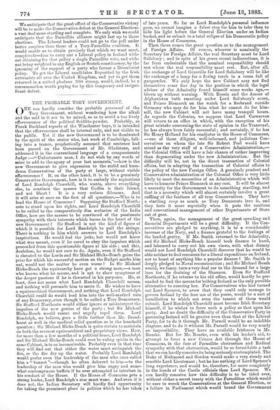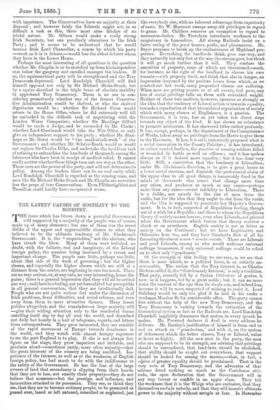THE PROBABLE TORY GOVERNMENT.
ONE can hardly consider the probable personnel of the Tory Government, without wondering how the alkali and the acid in it are to be mixed, so as to avoid a too lively effervescence of the political Seidlitz-powder. Probably, as Frank Buckland reports of the Winchester boys, it is intended that the effervescence shall be internal only, and not visible to the public. Yet if the new Government is to be dominated by the spirit of the orator who, last week at Cambridge, falling into a trance, prophetically assumed that sentence had been passed on the Government of Mr. Gladstone, and addressed it in the conventional language of a compassionate Judge :—" Unfortunate man, I do not wish by any words of mine to add to the agony of your last moments,"—how is the new Government to give expression to the stolid and humdrum Conservatism of the party at large, without visible effervescence V If, on the other hand, it is to be a genuinely Conservative Government, how is it to embody the aspirations of Lord Randolph Churchill, who wants, above everything else, to convince the masses that Codlin is their friend,
and not Short ? It is a very serious dilemma. And it will arise at once on the first of all questions,—Who is to lead the House of Commons ? Supposing Sir Stafford Northcote to stand upon his rights, and Lord Randolph Churchill to be exiled to the comparatively dim seclusion of the India Office, how are the masses to be convinced of the passionate sympathy with their interests which burns in the heart of the new Government ? Sir Stafford is not the kind of figure of which it is possible for Lord Randolph to pull the strings. There is nothing in him which answers to Lord Randolph's inspirations. He would feel the jerks, but would not know what was meant, even if he cared to obey the impulses which proceeded from this questionable figure at his side ; and this, doubtless, he would not care to do. Again, even if Sir Stafford is elevated to the Lords and Sir Michael Hicks-Beach gains the prize for which his successful motion on the Budget marks him out, would not the matter be even worse ? In Sir Michael Hicks-Beach the squirearchy have got a strong man,—a man who knows what he means, and is apt to show symptoms of the deeper passions if he is thwarted in his purposes. He, at least, does not mean what Lord Randolph Churchill means, and nothing will persuade him to mean it. He wishes to have a squirearchical Government, and nothing that Lord Randolph Churchill could do would lead him into the well-marked ruts of any Democracy, even though it be called a Tory Democracy. Sir Stafford Northcote would either ignore or misinterpret the impulses of the new genius of the party ; but Sir Michael Hicks-Beach would resent and angrily repel them. Lord Randolph, we believe, goes a little further than Mr. Broadhurst as well in the medical relief question as in the leasehold question ; Sir Michael Hicks-Beach is quite certain to maintain on both the severest squirearchical and proprietary views. How, for more than a few months of a political truce, Lord Randolph and Sir Michael Hicks-Beach could ever be ruling spirits in the same Cabinet, is to us inconceivable. Probably even in that time they will find out that either the water must extinguish the fire, or the fire dry up the water. Probably Lord Randolph would prefer even the leadership of the man who once called him a " bonnet "—though he often deferred to him—to the leadership of the man who would give him angry and somewhat contemptuous buffets if he ever attempted to interfere in his conduct of the House. If the House of Commons gets a strong leader, Lord Randolph's star must wane. And even if it does not, the Indian Secretary will hardly find opportunity for taking the prominent place in politics which he has taken of late years. So far as Lord Randolph's personal influence goes, we cannot imagine a falser step for him to take than to hide his light before the General Election under an Indian bushel, and so submit to a total eclipse of his Democratic policy in the House of Commons.
Then there comes the great question as to the management of Foreign Affairs. Of course, whoever is nominally the Secretary for Foreign Affairs, the real Secretary must be Lord Salisbury ; and in spite of his grave recent indiscretions, it is far from undesirable that the nominal responsibility should rest where the real responsibility must rest. But, after all, the exchange of Lord Granville for Lord Salisbury will be like the exchange of a lamp for a flaring torch in a room full of gunpowder. We only hope the new Cabinet may not find themselves some fine day in the position in which the legal adviser of the Admiralty found himself some weeks ago,— blown up without warning. With Russia and the Ameer of Afghanistan both smarting under Lord Salisbury's scorn, and Prince Bismarck on the watch for a firebrand outside Germany who may do for him what he cannot do for himself, the new Cabinet will not have many tranquil hours. As regards the Colonies, we suppose that Lord Carnarvon will return to an office in which, with the exception of his great mistake concerning the state of opinion in the Transvaal, he has always been fairly successful ; and certainly, if he has Sir Henry Holland for his coadjutor in the House of Commons, —one of those diligent, well-informed, and judicious Conservatives on whom the late Sir Robert Peel would have seized as the very staff of a Conservative Administration,— the Colonial Office will have a fair chance of rather improving than degenerating under the new Administration. But the difficulty will be, not in the direct transaction of Colonial affairs, but in adapting the transaction of Colonial affairs to the policy of the new Foreign Office. A genuinely prudent and Conservative administration of the Colonial Office is very little likely to meet the necessities of an Administration which will have to humour Prince Bismarck at any cost. It will be almost a necessity for the Government to do something startling, and that is a necessity which will almost certainly involve a great ruffling of the feathers of all true Conservatives. They hate a startling coup as much as Tory Democrats love it, and they hate it more especially when it puts the cautious and conventional management of other Departments of State out of gear.
Then, again, the management of the great spending and financial Departments will be a great difficulty. If the Conservatives are pledged to anything, it is to a considerable increase of the Navy, and a finance grateful to the feelings of the landed gentry. If Mr. Smith returned to the Admiralty, and Sir Michael Hicks-Beach himself took finance in hand, and laboured to carry out his own views, with what dismay would not Lord Randolph Churchill discover that he would be able neither to find resources for a liberal expenditure on Ireland, nor to boast of anything like a popular finance Mr. Smith is deeply pledged to Naval reconstruction ; and Sir Michael Beach would, we fancy, turn a very deaf ear to the demand for a large loan for the draining of the Shannon. Even Sir Stafford Northcote, if he returns to his old office, would hardly be persuaded to find the means for bribing Ireland as the only possible alternative to coercing her. For Conservatives who had turned out Lord Spencer, to avow that they could only manage to govern Ireland by the free use of the purse, would be a sort of humiliation to which not even the tamest of them would submit. Lord Randolph Churchill must become Irish Secretary himself, if he wishes to force such a policy as that upon his party. And no doubt the difficulty of the Conservative Party in governing Ireland will be greater even than that of the Liberal Party, for to do it through Mr. Parnell would be an indelible disgrace, and to do it without Mr. Parnell would be very nearly an impossibility. They have an available Irishman in Mr. Bourke. But for Mr. Bourke, even with his leader's aid, to attempt to force a new Crimes Act through the House of Commons, in the face of Parnellite obstruction and Radical sympathy with that obstruction, would be so formidable a task that we can hardly conceive its being seriously contemplated. The Duke of Richmond and Gordon would make a very steady and sensible Lord Lieutenant ; but he has nothing of Lord Spencer's long experience, and would be, therefore, far more completely in the hands of the Castle officials than Lord Spencer. We can hardly conceive how this difficulty is to be tided over, without either a secret treaty with the Parnellites which would be sure to wreck the Conservatives at the General Election, or a failure in Parliament which would brand the Government with impotence. The Conservatives have no majority at their disposal ; and however fairly the Liberals might act, in so difficult a task as this, there must arise hitches of no trivial nature. Mr. Gibson would make a really strong Irish Secretary, but one peculiarly obnoxious to the Irish Party ; and it seems to be understood that he would become Irish Lord Chancellor, a course by which his party —weak as it is in debate,—would lose the ablest debater whom they have in the Lower House.
Perhaps the most interesting of all questions is the question whether Mr. Chaplin is to be snatched up from his independent seat below the gangway and enrolled amongst the leaders. If so, the squirearchical party will be strengthened and the Tory Democrats depressed. Lord Randolph Churchill will find himself opposed not only by Sir Michael Hicks-Beach, but by a squire sheathed in the triple brass of absolute inability to apprehend Tory Democracy. There is no use in considering prematurely whether any of the former Conservative Administration would be shelved, or who the shelved dignitaries would be ; whether Sir Richard Cross would return to the Home Office, where he did extremely well till he embarked in the difficult task of negotiating with the London Water Companies ; whether Sir Hardinge Giffard would be made a Judge, and be succeeded by Mr. Clarke ; whether Lord Cranbrook would take the War Office, or only give an independent support to his party ; whether Mr. Stanhope or Mr. Gorst would be " the maid-of-all-work " of the Government ; and whether Mr. Sclater-Booth would or would not replace Sir Charles Mike, and undertake the invidious task of refusing to enfranchise the hundreds of thousands among the labourers who have been in receipt of medical relief. It cannot really matter whether these things turn out one way or the other. These men are the pawns of the party, and will not determine its policy. Among the leaders there can be no real unity while Lord Randolph Churchill is regarded as the coming man, and men like Sir Michael Hicks-Beach and Mr. Chaplin are nevertheless the props of true Conservatism. Even Flibbertigibbet and Tressilian could hardly have co-operated worse.



































 Previous page
Previous page